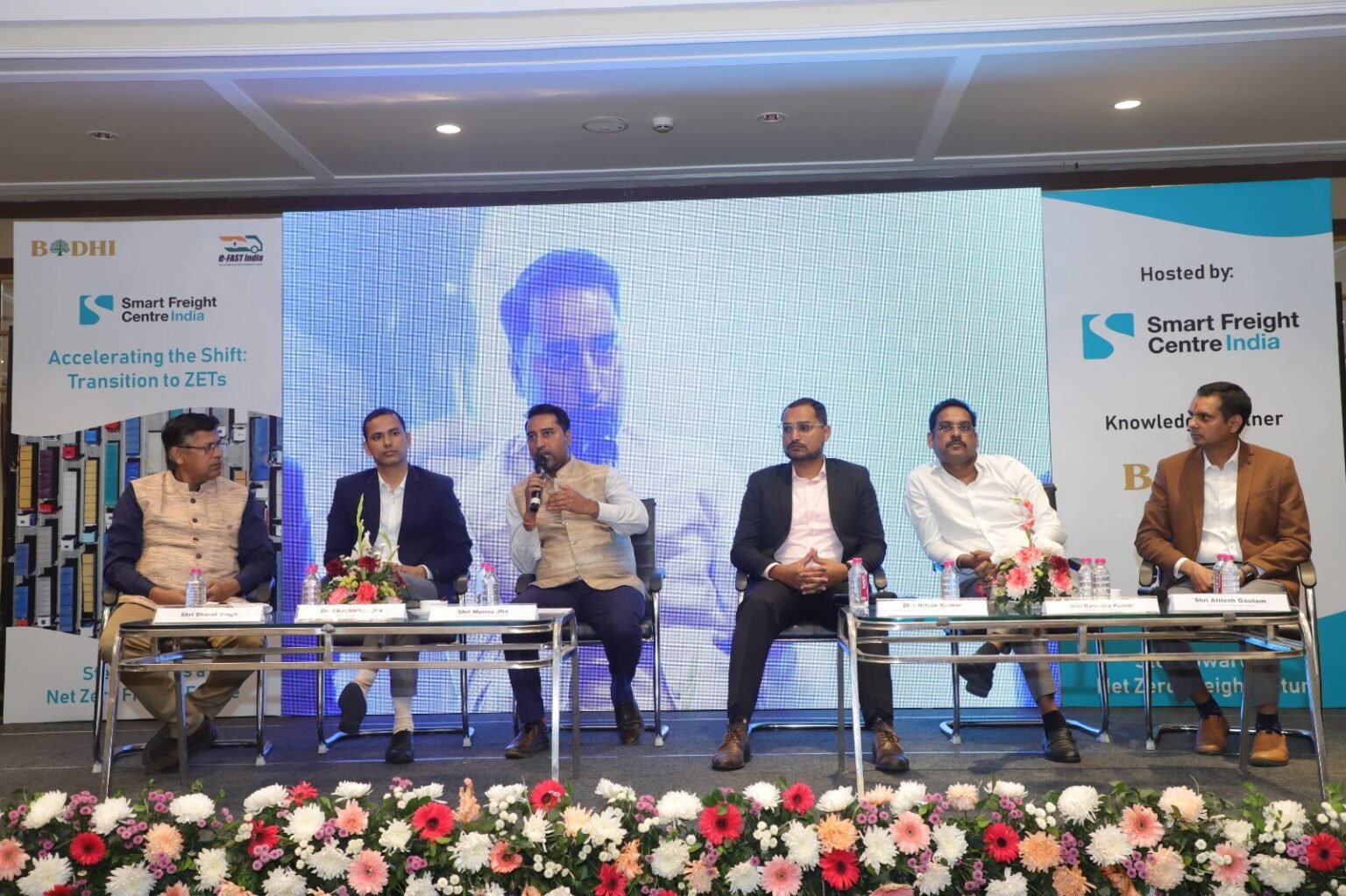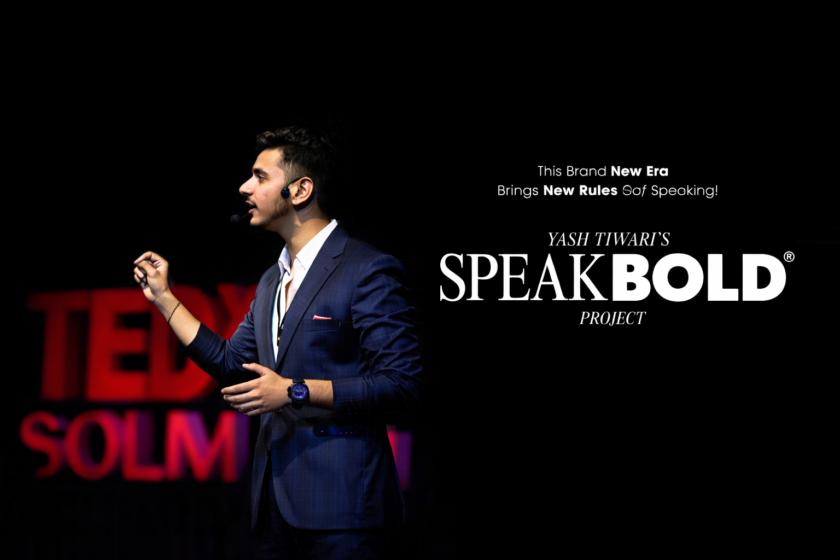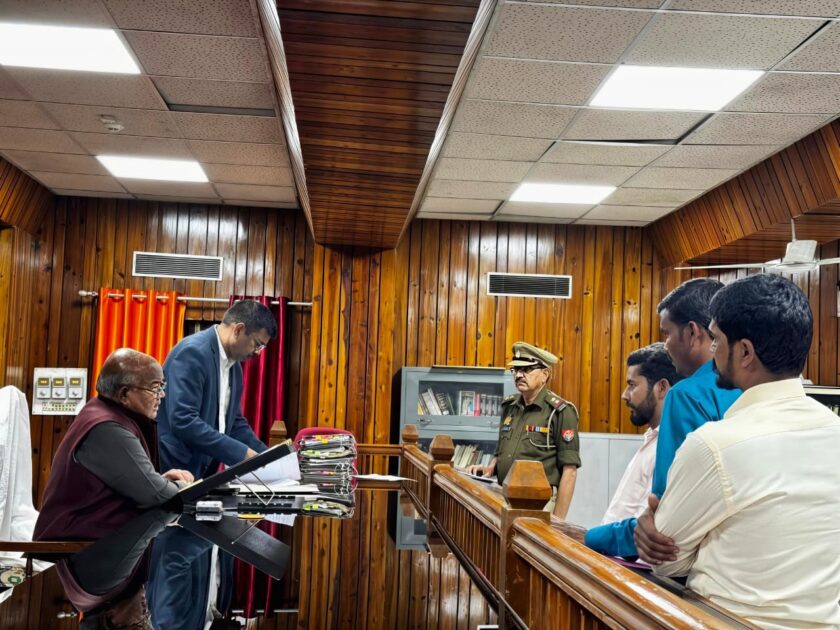Ranchi – The Smart Freight Centre India (SFC) organized a workshop in Ranchi focusing on Zero Emission Trucks (ZET), as part of a national initiative to promote ZET adoption in medium and heavy-duty trucks (MHDT) across India. The workshop, held in collaboration with the Jharkhand Government’s Industry Department, brought together key transportation experts to discuss challenges, opportunities, and necessary steps for the widespread adoption of ZET.
This event was conducted under NITI Aayog’s e-FAST initiative, aimed at raising awareness and fostering discussions on the technical and operational aspects of ZET implementation in India.
Key Discussions and Expert Insights
The workshop featured discussions on global transportation system shifts, the Indian government’s e-truck initiatives, urban adoption opportunities, and operational risks. SFC partnered with Bodhi as a knowledge partner to advance green logistics in Jharkhand.
A special roundtable discussion was moderated by Sharat Singh, Rural Development Advisor at GIZ India. The panel featured prominent experts, including:
- Nitish Kumar (IFS, DFO, Ramgarh, Department of Forest, Environment & Climate Change, Jharkhand)
- Ravindra Kumar (JAS, Deputy Administrator, Ranchi Municipal Corporation)
- Atilesh Gautam (Electrical Executive Engineer and SDA-in-charge, JREDA, Ranchi)
- Munna Jha (Climate Action Lead for Bihar & Jharkhand, ASAR)
- Dr. Shashidhar Jha (Director, Research & Knowledge Products, Bodhi)
Experts discussed adoption challenges, potential solutions, and the long-term environmental and economic benefits of ZET.
Government’s Commitment to Green Transportation
Jharkhand’s Industry Department Director, Mr. Sushant Gaurav (IAS), emphasized the state’s commitment to sustainable development. “Jharkhand is dedicated to green initiatives like zero-emission trucks. With 18 rare minerals, our state holds a pivotal position in clean energy transition. Through research and development, we aim to reduce import dependency and build a supportive ecosystem for future sustainability.”
He further highlighted the ‘Jharkhand Electric Vehicle Policy 2022,’ designed to incentivize EV manufacturing and sales, reinforcing the state’s commitment to green mobility. “ZET adoption is not just an economic or employment necessity but an essential environmental opportunity,” he added.
Industry Participation and Key Takeaways
Ashok Leyland delivered a key presentation on ZET advancements, while the World Resources Institute (WRI) led a session on PSA Bharat policy consultation, discussing policy frameworks and strategic recommendations for faster ZET adoption.

Key takeaways from the workshop included:
- Presentation by SFC on global ZET scenarios and India’s role in sustainable freight.
- The need for cleaner, environment-friendly freight models to address socio-economic and environmental challenges.
- Awareness campaigns to highlight the commercial, operational, cost, and sustainability benefits of ZET.
- Understanding ZET implementation pathways, regulatory challenges, and infrastructure requirements.
- Strategies for developing regional networks and governance frameworks to support freight electrification across India.
The Urgent Need for ZET Adoption
India’s economy, currently valued at $4.11 trillion, is heavily reliant on road transport for freight movement. Nearly 70% of domestic goods transportation occurs via roadways, resulting in 213 million tons of CO2 emissions annually, with heavy-duty trucks accounting for 83% of these emissions.
The PM e-Drive scheme has allocated ₹500 crore for e-trucks, promoting rapid adoption. If industry and policymakers collaborate effectively, ZET implementation could save 838 billion liters of diesel, reduce oil expenses by ₹116 lakh crore, and cut greenhouse gas emissions by 46% by 2050.
Future Roadmap and Industry Collaboration
Mr. Nitish Kumar (IFS, DFO, Ramgarh) remarked, “ZET adoption is not just about reducing pollution but building a robust green economy. Policy makers, industry leaders, financial institutions, and technical experts must work together to expand charging infrastructure and increase ZET awareness.”
The ZET Enablement Workshop series continues to bring together city administrators, OEMs, policymakers, LSPs, and shippers to develop sustainable logistics solutions. Previous discussions in cities like Indore, Chennai, Hyderabad, Delhi, and Thiruvananthapuram have focused on overcoming ZET adoption barriers, operational risks, and standard operating procedures.
About Smart Freight Centre India
Smart Freight Centre (SFC) is a global non-profit organization dedicated to climate action in the freight sector. Launched in May 2023, the SFC India program collaborates with stakeholders to counter the projected 400% increase in CO2 emissions by 2047. Through partnerships with NITI Aayog’s e-FAST and other key entities, SFC aims to drive freight electrification and decarbonization in India.









